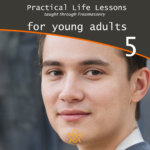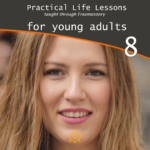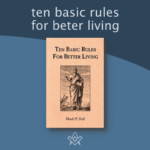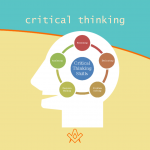A series of articles, produced by the Square Magazine, offering a guide to practical life lessons, taught through Freemasonry for young professionals, setting out in life after completing full time education.
Lesson 2 – Manage Your Finances and Budget Your Money
Why it is important to manage your finances and budget your money ?
Managing your finances and budgeting your money helps you to stay in control of your spending and avoid overspending and accumulating debt.
It allows you to save money for future goals and expenses, such as buying a home, paying for education, or building an emergency fund.
By budgeting your money, you can prioritize your spending and allocate your resources towards the things that are most important to you, such as investments, charity, or retirement savings.
How to manage your finances and budget your money
Determine your income and expenses: Start by determining your monthly income and all of your fixed and variable expenses. This will give you an idea of how much money you have to work with each month.
Create a budget: Once you have a clear picture of your income and expenses, create a budget that outlines how you will allocate your money each month. Be sure to include savings, debt repayment, and any unexpected expenses.
Track your spending: It’s important to track your spending to make sure you’re staying within your budget. Use a budgeting app or spreadsheet to keep track of your expenses and ensure you’re not overspending in any areas.
Prioritize your financial goals: Determine what your financial goals are and prioritize them. This could include saving for a down payment on a home, paying off debt, or building an emergency fund.
Cut unnecessary expenses: Take a look at your budget and see where you can cut unnecessary expenses. This could mean reducing your monthly subscription fees, eating out less, or cutting back on non-essential shopping.
Find ways to increase your income: If you’re struggling to make ends meet, consider finding ways to increase your income. This could include taking on additional work, selling items you no longer need, or finding ways to earn extra money on the side.
Create a savings plan: Set aside a specific amount of money each month to save for your financial goals. This could be a specific percentage of your income or a fixed amount.
Review and adjust your budget regularly: It’s important to review and adjust your budget regularly to make sure it’s still in line with your financial goals and needs. This could mean making changes to your spending habits, finding ways to save more money, or adjusting your savings plan.
Top Tips
1. Make a plan: Start by creating a budget that outlines your income, expenses, and savings goals. This will help you see where your money is going and identify areas where you can cut back or save more.
2. Prioritize your spending: Determine which expenses are essential and prioritize them in your budget. This may include housing, food, utilities, and transportation. Non-essential expenses, such as dining out or entertainment, can be cut back on or eliminated if necessary.
3. Track your expenses: Keep track of your spending to ensure you are staying on track with your budget. This can be done manually or with the help of a budgeting app or software.
4. Save automatically: Set up automatic savings transfers from your checking account to your savings account to ensure you are consistently saving money. This can help you reach your savings goals faster and avoid the temptation to spend your savings.
5. Reduce debt: Pay off high-interest debt, such as credit card balances, as quickly as possible to save on interest costs. Consider consolidating your debt or refinancing to a lower interest rate if possible.
6. Avoid unnecessary expenses: Be mindful of your spending and avoid making unnecessary purchases. This may include cutting back on subscription services or shopping for deals and discounts.
7. Build an emergency fund: Set aside a portion of your income each month to build an emergency fund that can cover unexpected expenses, such as a job loss or medical emergency. This will help protect you from falling into debt if an unexpected event occurs.
8. Invest wisely: Consider investing in low-risk, long-term investments, such as a 401(k) or IRA, to grow your savings and prepare for retirement. Seek advice from a financial advisor or professional before making any investment decisions.
9. Monitor your credit score: Regularly check your credit score to ensure it is accurate and to identify any potential errors. A good credit score can help you secure lower interest rates on loans and credit cards.
10. Seek help if needed: If you are struggling to manage your finances or budget your money, seek help from a financial advisor or professional. They can provide guidance and support to help you reach your financial goals.
If you found this article of interest, please share it with a young person in your family or community.
Full Series

Practical Life Lessons taught through Freemasonry
Learning and Development
A series of 10 learning and development articles, offering a guide to practical life lessons taught through Freemasonry for young adults setting out in life after full time education.
Overall, the lessons taught by Freemasonry are designed to help young adults develop the character, skills, and knowledge needed to succeed in life. By following the principles of brotherhood, charity, and self-improvement, young open minded individuals can build a strong foundation for a fulfilling and meaningful life.
The topics covered in the series are:
Lesson 1. How to communicate effectively and assertively.
Lesson 2. How to manage your finances and budget your money.
Lesson 3. How to take care of your physical and mental health.
Lesson 4. How to build and maintain healthy relationships.
Lesson 5. How to handle difficult emotions like anger, sadness, and fear.
Lesson 6. How to set and achieve goals for your personal and professional life.
Lesson 7. How to be open-minded and embrace diversity and inclusion.
Lesson 8. How to be a responsible and respectful member of your community.
Lesson 9. How to be a good partner and parent, if and when you decide to have a family.
Lesson 10. How to be adaptable and resilient in the face of challenges and change.
more ...
 Practical Life Lessons taught through Freemasonry - P1 A series of articles offering a guide to practical life lessons taught through Freemasonry for young adults setting out in life after full time education - Lesson 1; How to communicate effectively and assertively ? |
 Practical Life Lessons Taught Through Freemasonry - P2 A series of articles offering a guide to practical life lessons taught through Freemasonry for young adults setting out in life after full time education - Lesson 2: How to manage your finances and budget your money? |
 Practical Life Lessons Taught Through Freemasonry - P3 A series of articles offering a guide to practical life lessons taught through Freemasonry for young adults setting out in life after full time education - Lesson 3: How to take care of your physical and mental health |
 Practical Life Lessons taught through Freemasonry - P4 A series of articles offering a guide to practical life lessons taught through Freemasonry for young adults setting out in life after full time education - Lesson 4: How to build and maintain healthy relationships |
 Practical Life Lessons taught through Freemasonry - P5 A series of articles offering a guide to practical life lessons taught through Freemasonry for young adults setting out in life after full time education - Lesson 5: How to handle difficult emotions like anger, sadness, and fear |
 Practical Life Lessons taught through Freemasonry - P6 A series of articles offering a guide to practical life lessons taught through Freemasonry for young adults setting out in life after full time education - Lesson 6: How to set and achieve goals for your personal and professional life |
 Practical Life Lessons taught through Freemasonry - P7 A series of articles offering a guide to practical life lessons taught through Freemasonry for young adults setting out in life after full time education - Lesson 7: How to be open-minded and embrace diversity and inclusion for your personal and professional life |
 Practical Life Lessons taught through Freemasonry - P8 A series of articles offering a guide to practical life lessons taught through Freemasonry for young adults setting out in life after full time education - Lesson 8: How to emerge as a responsible and respectful member of your community inyour personal and professional life |
 Practical Life Lessons taught through Freemasonry - P9 A series of articles offering a guide to practical life lessons taught through Freemasonry for young adults setting out in life after full time education - Lesson 9: How to be a good partner and parent, if and when you decide to have a family. |
 Practical Life Lessons taught through Freemasonry - P10 A series of articles offering a guide to practical life lessons taught through Freemasonry for young adults setting out in life after full time education - Lesson 10. How to be adaptable and resilient in the face of challenges and change. |
Recent Articles: skills
 7 Soft Skills Taught In Freemasonry Discover how Freemasonry nurtures seven irreplaceable soft skills—collaboration; Communication, Teamwork, Empathy, Flexibility, Conflict Resolution, Active Listening, and Trustworthiness. Explore how these essential human attributes, grounded in emotional intelligence and ethical judgment, remain beyond the reach of AI. |
 Freemasonry and Reskilling in the age of AI The article explores the challenges and strategies organizations face in reskilling their workforce in the era of automation and artificial intelligence. It highlights the need for companies to view reskilling as a strategic imperative and involve leaders and managers in the process. The article also emphasizes the importance of change management, designing programs from the employee's perspective, and partnering with external entities. |
 Ten Central Commandments or Principles of Freemasonry Embrace the wisdom of Freemasonry's teachings in your personal journey towards self-improvement and stronger leadership. By upholding virtues of integrity, compassion, and respect, and uniting these with a commitment to continuous learning and social responsibility, inspire change. Transform yourself and the world around you, fostering a legacy of positivity and enlightenment. |
 Freemasonry: A Guide to Fatherhood In the sacred halls of Freemasonry, fathers discover a hidden power to transform their parenting journey. With its timeless values, supportive community, and life-enriching teachings, Freemasonry empowers fathers to provide a moral compass, foster self-improvement, build stronger connections, and embrace the confidence and wisdom needed to navigate the complex realm of fatherhood. |
 Courage as a core value in Freemasonry Freemasonry, a revered fraternity, prioritizes virtues like honesty and charity. However, courage is foundational. From Plato to Maya Angelou, courage is vital for other virtues. Freemasonry's teachings, referencing events like Gettysburg, emphasize diverse courage forms. In today's divided world, Masons promote and exemplify courage, understanding its importance in facing challenges. |
 How Freemasonry Cultivates Ideal Entrepreneurial Traits Freemasonry's cryptic rituals hold timeless lessons for building entrepreneurial greatness. Through tests of passion, vision and skill, Masonic teachings forge ideal traits like grit, creativity and alliance-making needed to seize opportunity and elevate enterprises. The right commitment unlocks code for entrepreneurial success. |
 What you see praiseworthy in others "What you see praiseworthy in others, carefully imitate, and what in them may appear defective, you will in yourself amend". This passage of Masonic ritual (Taylors Working, Address to the w |
 How to Learn Ritual with a Learning Disorder So what do you do when faced with that little blue book? Most Masons when first looking at the ritual book can understandably be fazed – the tiny print, the missing words, the questions and answers! Learning ritual can be a challenging task for anyone, especially individuals with learning disorders, but it is not impossible. Here are some tips to help make the process easier. |
 A "mind palace", also known as a "memory palace", is a technique for memorizing and recalling information. How would your life change if you could remember anything and everything? Discover the 'Mind Palace' and all will be revealed. |
 What is leadership and who does freemasonry help develop those skills needed to be a better leader |
 A story of the 'Ruffians' – those individuals whose paths cross ours, who feel entitled to seize and consume the property of others that they have not earned. A lesson to build character to be a better citizen of the world. |
 Now we are back in the Lodge room once again, maybe it is time to review how we learn and deliver ritual and look at different ways of improving that process. |
 Making an advancement in Masonic Knowledge can become far easier when you 'learn how to learn'. |
 Learn how to practise Masonic meditation in a busy world with all its care and employments |
 Struggling to learn your ritual? Become a 5-Minute Ritualist with the aid of a book of the same name. |
 Day in the life of a Freemason As we start a new year, maybe start it with a new habit? |
 Ten Basic Rules For Better Living Ten Basic Rules For Better Living by Manly P Hall |
 How can we use masonic leadership skills to avoid confrontational situations? |
 How the Trivium is applied to Critical Thinking - {who, what, where, when} - {how} - {why} |
 The Seven Liberal Arts - why 'seven', why 'liberal', why 'arts'? |
 How to improve your public speaking skill with 6 techniques |
 Do you need to speak in public, or present Masonic ritual without notes ? |
 What are logical Fallacies and how to spot them |
 Share one easy tip to learn masonic ritual; Some good tips from Facebook followers |
 How can we use the 7 secrets of the greatest speakers in history |
 What is a critical thinker and what are their characteristics? |
 Share one personal skill Freemasonry helped you to improve? How can we make practical use of the lessons taught in Masonic writings? |
 An introduction to the art of public speaking - speak with confidence |
 Seven Liberal Arts and Sciences What do you know about Seven Liberal Arts and Sciences |
 Three Words That Will Change Your Life This article discuss a common situation found in many lodges - a difficulty in holding a conversation with a stranger. |
 Al - Khwarizmi live c750 - c820 is credited as being the father of Algebra, being asked what is Man, give his answer in an algebraic expression |
masonic knowledge
to be a better citizen of the world
share the square with two brothers

click image to open email app on mobile device









